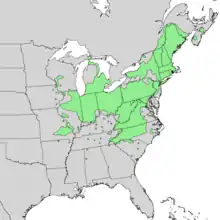| Salix sericea | |
|---|---|
 | |
| Bark and underside of leaf | |
| Scientific classification | |
| Kingdom: | Plantae |
| Clade: | Tracheophytes |
| Clade: | Angiosperms |
| Clade: | Eudicots |
| Clade: | Rosids |
| Order: | Malpighiales |
| Family: | Salicaceae |
| Genus: | Salix |
| Species: | S. sericea |
| Binomial name | |
| Salix sericea Marsh. | |
 | |
| Natural range of Salix sericea | |
Salix sericea, commonly known as silky willow, is a shrub in the Salicaceae family that grows in swamps and along rivers in eastern United States and Canada. It is 2 to 4 m (6.6 to 13.1 ft) tall and has long, thin, purplish twigs. The leaves are 6–10 cm long, 7–8 mm wide, lanceolate, acuminate, serrulate, dark green and lightly hairy on top, and light green and densely covered with white silky hairs underneath. Mature leaves are glabrous. The petioles are 1 cm long. Catkins are sessile and usually bracteate. S. sericea blooms in May and fruits in June.
References
Wikimedia Commons has media related to Salix sericea.
- ↑ Maiz-Tome, L. (2016). "Salix sericea". IUCN Red List of Threatened Species. 2016: e.T64324350A67730862. doi:10.2305/IUCN.UK.2016-1.RLTS.T64324350A67730862.en. Retrieved November 19, 2021.
.jpg.webp)
This article is issued from Wikipedia. The text is licensed under Creative Commons - Attribution - Sharealike. Additional terms may apply for the media files.
